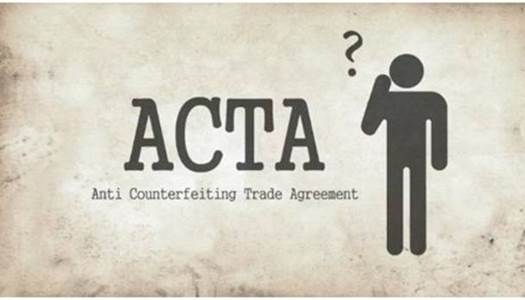Three Strikes and You’re Banned from the
Internet
While SOPA may not have succeeded in being
passed, the treatment meted out to Kim Dotcom and Megupload, if not literally
then metaphorically, may still end up becoming the accepted response to all
accused of being involved in copyright infringement and piracy. On the global
scale, several nations proposed an international trade agreement, named
Anti-Counterfeiting Trade Agreement or ACTA.
A large number of countries including
Singapore have already signed on, with Japan being the first to ratify the
trade agreement. If five more countries follow Japan’s suit and formally agree
to the multinational treaty, ACTA will come into effect.
Like SOPA, ACTA paints counterfeit goods
trafficking and copyright infringement with the same brush. The trade agreement
necessitates all participating signatories to impose their own criminal
sanctions in the form of fines and prison sentences for those accused of
copyright piracy on a “commercial scale” and those “aiding and abetting” it.
Unfortunately neither “commercial scale” nor “aiding and abetting” have been
properly defined.

On
the global scale, several nations proposed an international trade agreement,
named Anti-Counterfeiting Trade Agreement or ACTA.
The loose wording implies that everyone
from downloaders, on-line sites and ISPs could possibly be prosecuted.
According to Knowledge Ecology International, ACTA goes beyond TRIPS, the
copyright agreements detailed in the World Trade Organization, and creates an
entirely new realm of liability for service providers on the web.
With regards to the individual, ACTA is
proposing a Three Strikes Disconnection policy for people who are “serial
copyright infringers”. To put it bluntly, if you are caught downloading files
illegally on three separate occasions, ACTA can ban you from the internet. A
punishment more in line for someone who poses a national security risk through
their activities over the internet may be applied to someone who downloads a
song.

With
regards to the individual, ACTA is proposing a Three Strikes Disconnection
policy for people who are “serial copyright infringers”.
Though not passing this measure as legislation,
ACTA will strongly persuade ISPs to implement the Three Strikes Disconnection
policy for users who have been caught violating copyright laws if the ISPs in
question want to limit their own liability in the matter. To top it all off, an
ACTA committee will be established to enforce the trade agreement which will be
separate from the legal and judicial setup governments, effectively giving the
individual no way to affect democratic change with regards to ACTA.
The Internet is More than Just a Pirate
Bay
The International Telecommunications Union
(ITU), a specialized agency of the United Nations, met in Dubai in December
2012 to ponder the state of the internet. The conference approved the new
Y.2770 standard which allows for deep packet inspection in next generation
networks. This grants government access to data about user traffic statistics,
without taking into consideration most norms and policies concerning privacy of
communications.
Vinton Cerf, one of the co-founders of
serve as a building block of the internet spoke out against the decisions taken
by the ITU.
Protection for copyright and intellectual
property is required now in the digital age more than ever before. Piracy needs
to be stopped so that the people who produce content get their due. But the
measures detailed here are emblematic of a disturbing trend where governments
try to tackle the problem of piracy and copyright infringement behind closed
doors.
The result is increased pressure on
internet service providers to police their own networks, as seen with ACTA and
SOPA, along with stronger and stricter penalties for individuals. These steps
merely deal with the symptoms of piracy without addressing the underlying
causes.
The World Wide Web sprang up as a result of
open collaboration between scientists and engineers. It has since expanded at
an exponential rate, thanks to the fact that anyone wanting to contribute can
do so by just stepping up. It has given millions a platform to be heard, at an
ease and scale unheard of in human history. The efforts of governments seem to
be the anti-thesis of this formula. They seek to limit the contribution of
individuals and on-line service providers in the name of upholding intellectual
property and copyright laws. By making the price of piracy exorbitantly high,
they seek to stifle what they deem to be illicit and illegal behavior.

The
World Wide Web sprang up as a result of open collaboration between scientists
and engineers.
But if the governments of the world are
serious about combating privacy in a meaningful way, they have to seek input
from ISPs, online-service providers like Google and third party digital rights
activists like the Electronic Frontier Foundation (EFF). This would make sure
that in addition to the voices of content producers and governments, the voices
of the other actors on the internet will be heard. They need to acknowledge the
fact that the internet is used for more than just piracy, and that policies
regarding its use shouldn’t be informed only by the actions of a few.
Realizing this, pioneers like Richard
Falkvinge, who founded the Pirate Party in Sweden, have made the switch to
politics so that they can influence decisions regarding digital rights.
Similarly, government and legislative institutions should extend their hands to
external, involved parties when contemplating the future of the internet.
When cassettes first came about, the
entertainment industry assumed that the rise of home recording would mean the
end of a very profitable business. They had a similar response to VCR
cassettes. No surprises that the internet is being greeted with the same gloom
and doom. However, even more so than the other two technologies during their
times, the Internet seems to be a tour de force which is around to stay. Like
the entertainment industry did with cassettes and VCRs, they will have to
incorporate the internet and digital aspects of content production, creation
and distribution into their existing models, instead of just treating everyone
like a pirate.